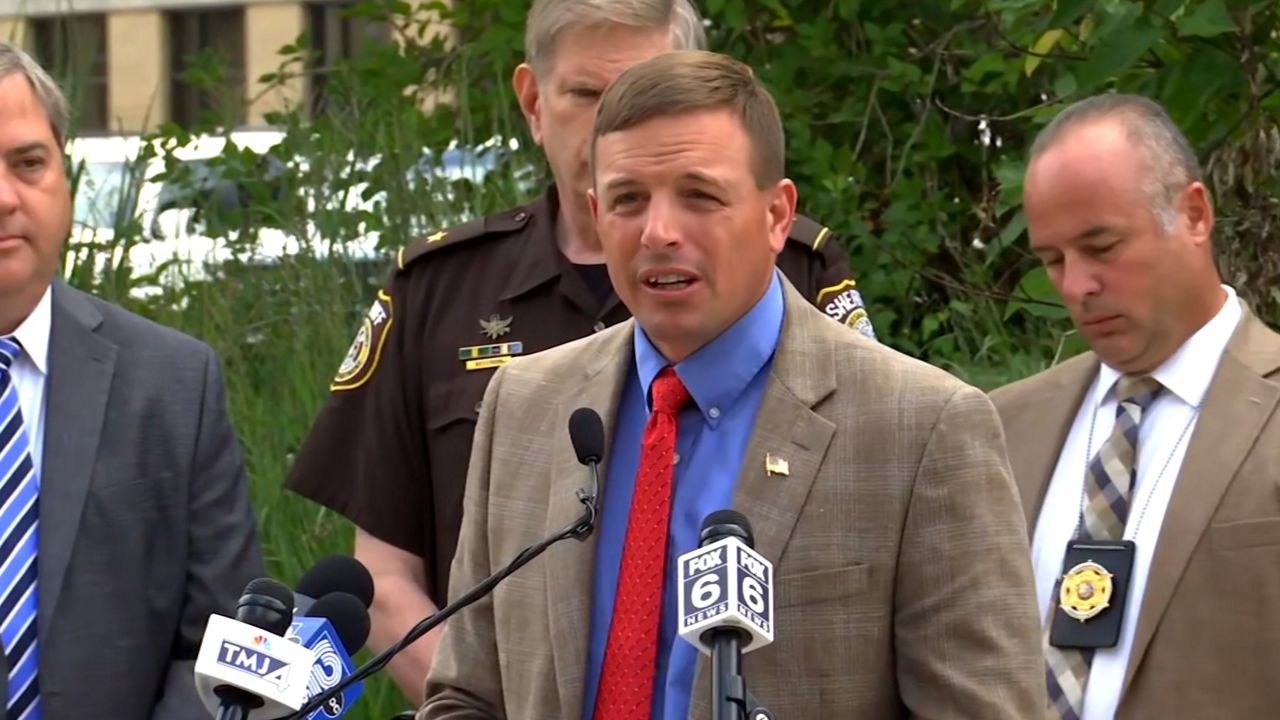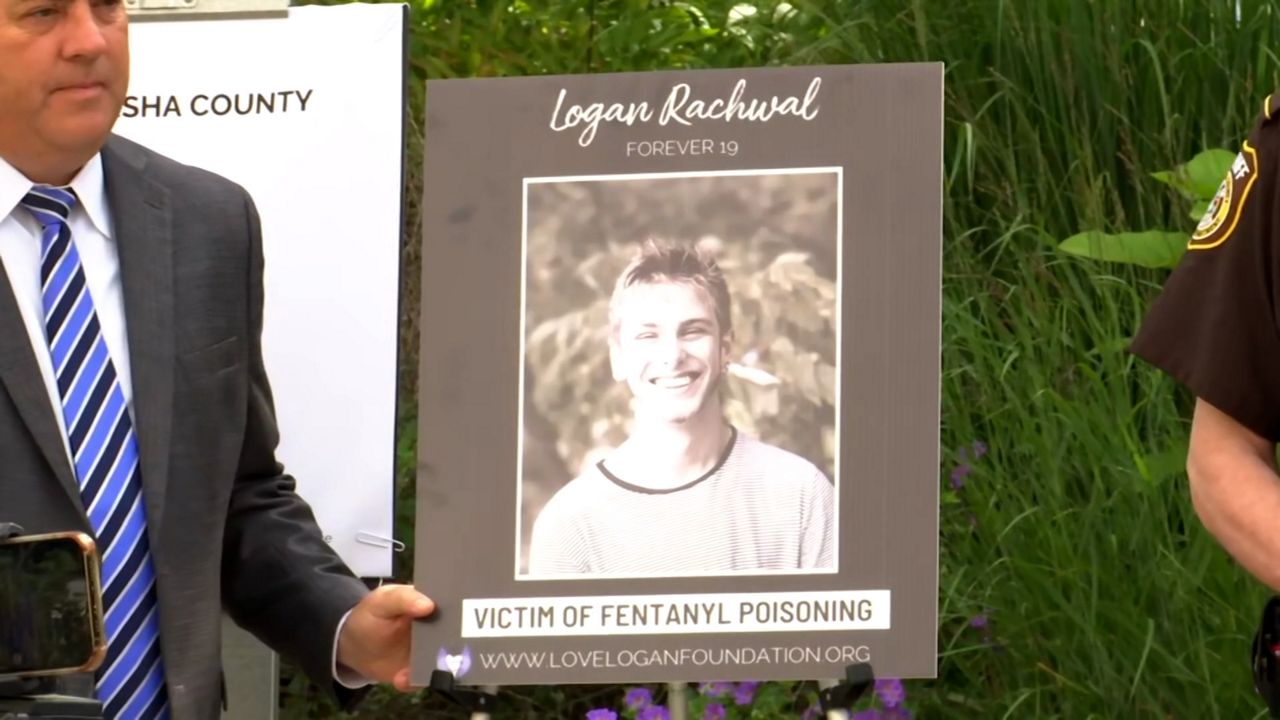WAUKESHA, Wis. — Law enforcement and local leaders in both Waukesha and Washington counties have teamed up to tackle a spike in fentanyl-related deaths in their communities.
Washington County Executive Josh Schoemann and Sheriff Martin Schulteis joined Waukesha County Executive Paul Farrow and Sheriff Eric Severson to hold a press conference Monday to address the ongoing crisis.
It doesn't matter whether you live in rural or urban Wisconsin, the crisis has affected all genders and races.
Drug-related fatalities are the leading non-natural cause of death for adults 18-45, not just in these counties but across America.
In Washington County alone, opioid-related deaths rose from 16 in 2015 to 25 in 2020.

So far this year, there have been 23 deaths, which means last year's record could be tied or even surpassed.
According to the medical examiner's office, 87% of overdose deaths involved fentanyl.
County Executive Paul Farrow said it is a similar story in Waukesha County.
“In 2020, we saw the worst year ever of drug-related deaths at 95,” Farrow explained. “In '21, we're still tallying the final numbers, but as of right now, we have 92 drug overdoses, and we still have 10 that are under investigation.”
In Waukesha County, Farrow has declared fentanyl a community health crisis and, in doing so, issued four main directives:
- Distribute opioid settlement money, in partnership with the County Board, to support Narcan training, the District Attorney's pre-trial diversion programming, and other related purposes
- Implement the Overdose Fatality Review (OFR) initiatives, in partnership with public and private entities and surrounding counties to share data and best practices
- Launch a local public information initiative utilizing the U.S. Drug Enforcement Agency's 'One Pill Can Kill' campaign
- Create a set of measurable objectives to track the county's efforts in the fight against fentanyl that will be evaluated quarterly
“Many people think they are taking a prescription medication, but they are taking fentanyl instead,” Farrow said. “This deadly drug is appearing in every community across the United States, including here at home. Now, we are doubling down on our work to save lives.”
The Fentanyl Community Health Crisis Declaration isn't the only way Waukesha County has fought the opioid crisis. There have been multiple programs focused on prevention, treatment, and enforcement.
Erin Rachwal, who cofounded 'Love, Logan' after losing her 19-year-old son, Logan, to fentanyl in 2021, talked about the importance of community education.
“One of the biggest reasons why we are speaking out, and why we started a foundation called 'Love, Logan,' is that kids don't know about the signs, and if some of the kids involved in Logan's death, or that would have witnessed some of it, if they would have known the signs, if they would have been aware and we were educating these kids and parents, it could have saved his life,” Rachwal said. “I know hundreds of stories of other moms that I've talked to that have nodded their heads and said the same thing.”

Meanwhile, Washington County has similar programs and services, but County Executive Josh Schoemann also has a plan that will be up to the voters.
“By a referendum, the Washington County Crime Plan will put deputies in schools, add detectives to the drug task force, and partner social workers with deputies to co-respond to mental health and substance use-related calls,” Schoemann explained.
The Washington County Health and Human Services Department (HHS) has also provided other programs and services to connect residents with the substance use resources they need. Last month, the county launched a local campaign called 'Change the Ending' to help those struggling with mental health and substance use find resources.
Wisconsin is set to receive a total of nearly $400 million over the next 18 years as part of a national settlement with various U.S. drug distributors and manufacturers.
70% of those funds will go to local governments that joined those lawsuits, while 30% goes to the state health department.
Most recently, the Wisconsin Department of Health Services (DHS) announced Monday that it received its first payment of more than $6 million from the National Prescription Opiate Litigation (NPOL) settlement. As required by state law, DHS submitted an updated proposal to the legislature's Joint Committee on Finance for how to use and spend the nearly $31 million in total Wisconsin was awarded from the NPOL.
DHS plans to use a variety of strategies, including:
- Making immediate investments in harm reduction
- Investing in harm reduction by increasing the availability of Narcan and fentanyl test strips around the state
- Making investments in new and updated treatment facilities
- Funding for tribal nations to address the dramatic increase in opioid overdose deaths
- Enhancing data collection and surveillance
- Funding for family support centers to provide information, education, and healthy coping skills, while building resiliency, for family and friends of a person with substance use disorder
“The settlement funds will go a long way toward enhancing our efforts to help people with opioid use disorder and prevent future misuse, overdoses, and deaths,” DHS Secretary-designee Karen Timberlake said. “We have been committed to continuous collaboration as we have planned for these funds to arrive. Our proposed investments have been informed by recommendations from the public, advocates, providers, first responders, and other partners, to avoid a ‘one-size fits all approach’ to addressing the state’s opioid crisis.”
The opioid crisis began in the late 1990s in Wisconsin and has continued to grow ever since. There has been an almost 900% increase in opioid overdose deaths between 1999 and 2018, according to DHS. Opioid overdose deaths decreased by 10% in 2018 but increased to a record-high of 1,227 in 2020.
In April, Spectrum News 1 debuted the half hour special 'Fighting Fentanyl' during which Anthony DaBruzzi looks at the role fentanyl plays in overdoses across our state and how you can help someone stay safe in case of an overdose.
Watch the full special here.



